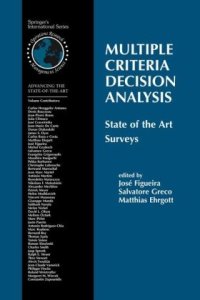
Ebook: Multiple Criteria Decision Analysis: State of the Art Surveys
- Genre: Mathematics // Optimization. Operations Research
- Tags: Operations Research/Decision Theory, Operations Research Mathematical Programming, Econometrics, Optimization, Mathematical Modeling and Industrial Mathematics, Production/Logistics
- Series: International Series in Operations Research & Management Science 78
- Year: 2005
- Publisher: Springer-Verlag New York
- Edition: 1
- Language: English
- pdf
MULTIPLE CRITERIA DECISION ANALYSIS: State of the Art Surveys is the most comprehensive work available to survey the state of the art in MCDA to date. Its 24 chapters are organized in eight parts and are written by 49 international leading experts. Each of these parts covers one of the central streams of multiple criteria decision analysis literature. These literature streams are: MCDA today, Foundations of MCDA, Outranking Methods, Multiattribute Utility Theory, Non-Classical MCDA Approaches, Multiobjective Mathematical Programming, Applications, and MCDM Software.
The handbook presents the most up-to-date discussions on well-established methodologies and theories in the field, while systematically surveying emerging fields in MCDA such as conjoint measurement, fuzzy preferences, fuzzy integrals, rough sets, etc. MULTIPLE CRITERIA DECISION ANALYSIS is a valuable reference volume (more than 2000 references) for the field of decision analysis. It provides graduate students, researchers, and practitioners with a sweeping survey of MCDA theory, methodologies, and applications. It is a handbook that is particularly suitable for use in seminars in Decision Analysis, Decision Support, and Decision Theory.
Multiple Criteria Decision Analysis: State of the Art Surveys provides survey articles and references of the seminal or state-of-the-art research on MCDA. The material covered ranges from the foundations of MCDA, over various MCDA methodologies (outranking methods, multiattribute utility and value theories, non-classical approaches) to multiobjective mathematical programming, MCDA applications, and software. This vast amount of material is organized in 8 parts, with a total of 25 chapters. More than 2000 references are listed.